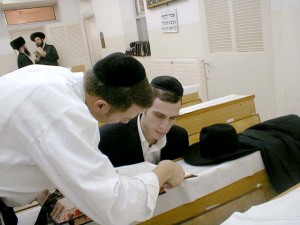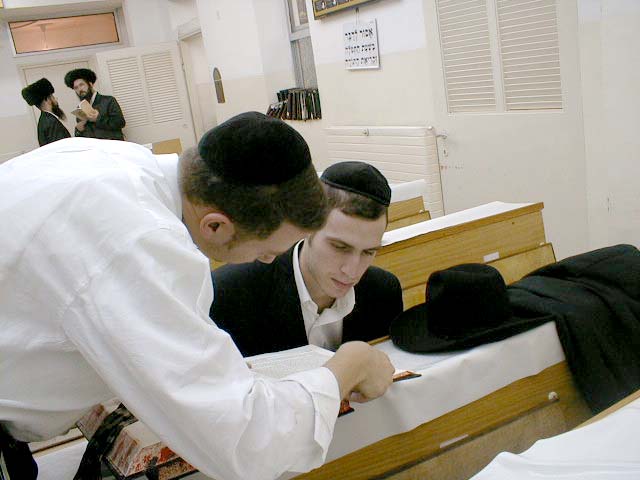
Moshe was pasturing the flocks of Yisro, his father-in-law, the priest of Midian, and he led the flocks after the free pastureland, and he came to the mountain of G-d, to Horeb. An angel of HASHEM appeared to him in a flame of fire from within the thorn bush, and behold, the thorn bush was burning with fire, but the thorn bush was not being consumed. So, Moshe said, “Let me turn now and see this great spectacle why does the thorn bush not burn up?” HASHEM saw that he had turned to see, and G-d called to him from within the thorn bush, and He said, “Moshe, Moshe!” And he said, “Here I am!” And He said, “Do not draw near here. Take your shoes off your feet, because the place upon which you stand is holy soil.” (Shemos 3:1-5)
Why does the Holy Torah begin with the letter Beis and not Alef which is the first letter? Right from the very beginning the Torah and life is riddled with essential questions. Why is that so? Is this world and is the Torah an answer book or a question book?
Pardon the “secular” reference but I remember there used to be a game show, called “Jeopardy”. The format, if I remember correctly, was a little odd. One would be given a piece of information and that needed to be assigned to the correct question. Fact: “Elizabeth!” Question: “Who was the last Queen of England?” That’s how it goes!
Learning Rashi can be like that very often. He provides some important information and we are left to figure out: “What burning question is Rashi coming to answer?” The assumption is that if everything was clear then he would say nothing.
A simple case is the burning bush. Moshe is told to remove his shoes and the reason that is given is because, “the place upon which you stand is holy soil”. Rashi adds here to the words “is holy soil (adama)”: “The place”. Now why is that necessary? The Sifsei Chachamim explains that there seems to be a confusion in the verse. The word for ground – “Adama” is feminine and yet it is referred to with a masculine pronoun – “Hu”. Rashi clarifies that “Hu” is in reference to the “place” and not specifically to the earth in that place.
So, it goes with all the phenomena of this world. The universe is filled with myriads of facts and answers. What questions are they coming to answer? Who made this? What does it teach us? What is its purpose? An anonymous philosopher once stated, “There is nothing more irrelevant than the answer to a question that was never asked? Maybe now we can understand why the game was called “Jeopardy”. If we fail to ask the right question then everything in the world is at risk of being rendered irrelevant! If we ask the right questions with enough genuine curiosity then everything has the possibility of becoming ultimately meaningful!
It is no mistake, therefore, that the beginning of the exodus, the initiation of the one who would lead the Jewish Nation not just out of Egypt but to Mount Sinai where we would receive the Torah, begins with a test of his inquisitiveness. Moshe notices a burning bush that is blazing with fire but not being consumed by that fire. He is busy with his flock but he pauses to study this phenomenon and asks a simple question, “why does the thorn bush not burn up?” Only when HASHEM sees that his interest is piqued by this visage does He call out to Moshe.
The Ramchal writes in Derech Etz Chaim: “A man, most of his years are spent in thinking thoughts on his businesses, business of this temporary world. Why does he not put to heart even one hour also on thinking these other things “What is he? Why did he come to this world? Or what does the King of kings seek from him? What will be the end of his matter? … “What did the early ones, the fathers of the world do that G-d desired in them? What did Moshe Rabeinu do? What did David, the Moshiach Hashem do, and all the Gedolim who lived before us?”
Albert Einstein, the icon of secular Jewish genius, said, “The important thing is not to stop questioning. Curiosity has its own reason for existing. One cannot help but be in awe when he contemplates the mysteries of eternity, of life, of the marvelous structure of reality. It is enough if one tries merely to comprehend a little of this mystery every day. Never lose a holy curiosity.”


